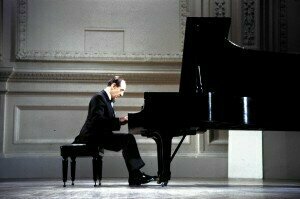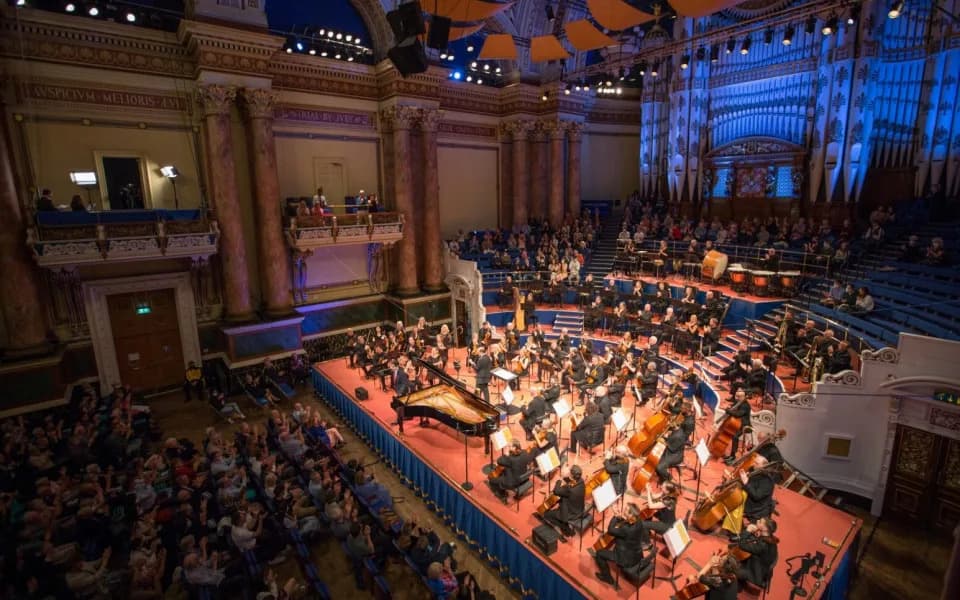
Vladimir Horowitz at Carnegie Hall
n.
The interaction of two or more agents or forces so that their combined effect is greater than the sum of their individual effects.
“those three minutes of perfection – when time stands still and the music just washes over you….”
Bruce ‘The Boss’ Springsteen
Those of who play and listen to music regularly known what The Boss is talking about: that moment when one is ‘transported’, taken out of oneself; where the experience transcends the norm and seems to take one to another plane of consciousness. Such moments can be rare, and so they must be cherished because they can be fleeting and soon forgotten.
When one is playing music, it is even harder. In order to achieve such a state, one must work hard, for one must know the music intimately – and such intimacy only comes from repetitive work and thoroughly immersing oneself in the music. One must also possess purpose and focus, trust in one’s musical self, have a highly-developed ability to concentrate, blanking out all other distractions, and be able to stand back from oneself and the music.
I used to find it hard to concentrate on my practising, easily distracted by extraneous sounds: a dog barking, a road drill, my neighbour mowing his lawn. Gradually, I trained myself to ignore these sounds; they merged into the background, becoming a foil for the music instead of competing with it. Sometimes the sounds of nature are helpful: working on Debussy’s ‘Voiles’ in the summer, with the French windows flung open, I listened to the wind in the bamboos in my garden, and drew inspiration from that sound.
Some days, when I’m practising something for technique alone, a passage of Chopin, for example, which is just fingerwork, purely mechanical playing, before the shaping and finessing begin, I can let my mind wander, but not too far because there needs to be a degree of engagement to ensure the fingers land in the right place each time. This kind of practising acts as an exercise, to strengthen the fingers and to train the muscular memory to achieve accuracy. As Vladimir Horowitz said “From the moment one feels that the finger must sing, it becomes strong”: it is at this point that one stops playing mechanically and begins to play musically. Pianists, who draw so much information from the tips of the fingers – almost as if one has “eyes in the fingertips” – can feel when that moment is achieved. Rather like an athlete “in the zone”, reaching that point of perfect synergy between body and mind, when all limbs, lungs and heart seem to be working properly and the action becomes fluid, comfortable, beautiful.
When one plays in this state, it seems as if everything has fallen into place. Sometimes, it even feels easy! I have the sensation of observing myself, standing back from the music, and myself, watching myself playing. There is a sense of having “let go” – and yet, it is at this point that one is concentrating most intensely.
Debussy: Voiles from Preludes Book 1 (Pierre-Laurent Aimard)
In his excellent book ‘The Inner Game of Music’, Barry Green (a professional double-bassist) talks about having two “Selfs”: Self 1 is critical, cautious, doubting, sensible, interfering. It gets in the way, telling us what we should and should not be doing; it predicts successes and failures, and talks of “if only”. Self 1 can also be extremely distracting. Self 2 is intuitive, tapping into the vast resource of our nervous system and drawing information from non-verbal cues, and our memory-bank of past musical experiences: everything we have heard, learned from others, or experienced ourselves. Self 2 is more creative, and is connected to an earlier, childhood state – that wide-open, receptiveness that exists in children until they are about eight years old, ready to absorb whatever comes before us. As we grow up, subtle changes occur as we begin to collect information, ideas, attitudes, and form our own conclusions. We also become more cautious, more risk-averse, more fearful of the consequences of our actions, and the gap between our “critical” self (Self 1) and our “creative” self (Self 2) widens. The ability to spontaneously tap into our intuitive resources of Self 2 disappears, as Self 1 takes over. It is possible to train oneself to let Self 2 back in, to master what Barry Green calls “the inner game” (a technique borrowed from tennis coaching), and to reduce mental interference which can inhibit the full expression of one’s musical (or sporting) capabilities.
Choosing to ignore Self 1’s commands, its “what ifs” and “if onlys” is an important process in learning good concentration skills and teaching us to trust our musical selves. It is also crucial in helping to overcome performance anxiety.
So, those “three minutes of perfection”, which Bruce Springsteen describe, that moment of perfect synergy, are a true product of one allowing Self 2 to take over, driving out the doubts and fears of Self 1, letting one’s true musical self play, and permitting one’s fingers, hands and body to make the decisions.
Further reading
Green, Barry: The Inner Game of Music. Pan Books. London, 1987 —————- The Mastery of Music. Macmillan. London, 2003
Rink, John: Musical Performance: A Guide to Understanding. Cambridge University Press, 2002
Westney, William: The Perfect Wrong Note: Learning to Trust Your Musical Self. Amadeus Press, 2006
Bernstein, Seymour: With Your Own Two Hands: Self-Discovery Through Music. 1981
Chopin: Ballade No. 1 in G minor (Evgeny Kissin)




